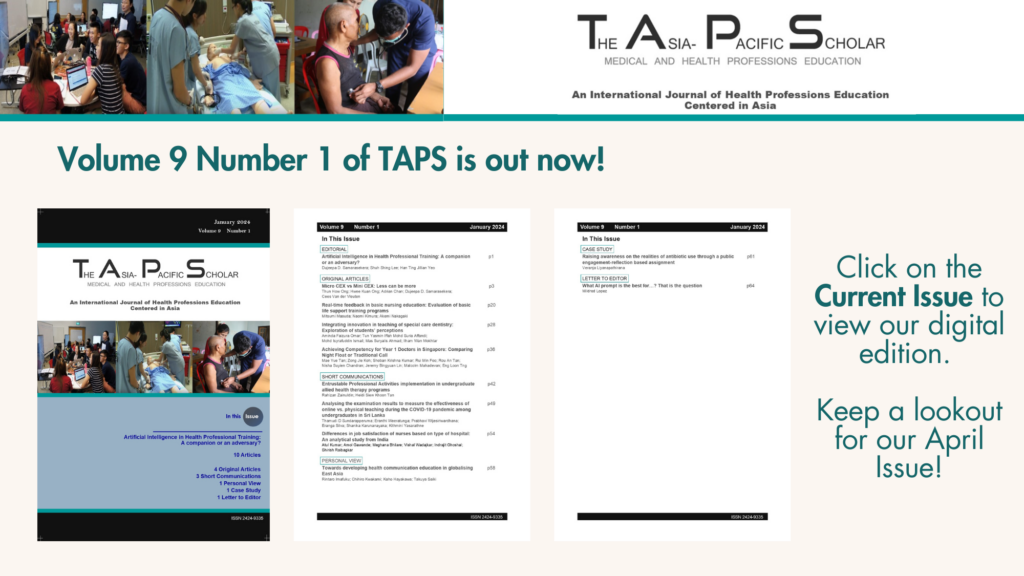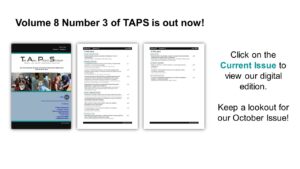The Implications of Culture in the Education and Practice of Healthcare Professionals
Published online: 3 September, TAPS 2019, 4(3), 1-2
DOI: https://doi.org/10.29060/TAPS.2019-4-3/EV4N3
1Judy McKimm & 2Hiroshi Nishigori
1Strategic Educational Development, Swansea University Medical School, Swansea University, United Kingdom; 2Center for Medical Education, Nagoya University Graduate School of Medicine, Japan
It has been a pleasure for us to act as guest editors for this themed issue on the Implications of Culture in the Education and Practice of Healthcare Professionals. We thank the TAPS Editorial team, our reviewers, and authors for all their hard work and patience and we hope you enjoy this varied issue with articles from around the region, and the world.
The Lancet Commission’s Report on Health Professionals for a New Century (Bhutta et al 2010) emphasised the interconnectedness between education and health systems and that we live and work in a ‘global village’. This is highlighted in the paper considering the cross-cultural implications of a ’transnational’ faculty providing clinical teacher training. Many factors affect the education and practice of healthcare professionals, including the resources available, however tradition, language and culture are hugely influential, whatever the resource setting. Understanding the cultural contexts in which we work is vital as, without this, we may be misunderstood, unable to influence change, or cause offence. ‘Culture’ is a broad term, referring to the society and its subcultures, cultural influences, organisational culture, the sub-cultures of professions (tribes and territories), and of students (the ‘hidden curriculum’). The impact of the ‘hidden curriculum’ is explored in a Thai context, with an article looking at cultural influences on peer-assisted learning. And of course, culture(s) are located in both the past (the influence of history, legacy and tradition) as well as being influenced by internal and external forces and events.
‘The needs of the global community are best served by practitioners who can function effectively and flexibly in an ever-changing and unpredictable world, across cultures and under different social conditions and who are social and environmental advocates for all communities, not just for those in which they live and work’ (McKimm & McLean 2011). It is important therefore that we try to develop ‘cultural intelligence and competency’ in our students, practitioners and faculty, and this theme runs throughout this issue. Two articles focus on specific educational initiatives designed to develop cultural competency in residents (doctors in training) and General Practitioners (family doctors), considering what might work and whether these skills are generalizable or need to be contextually situated. Individual and group identity is closely tied to the cultures from which people come, in which they live and with which they identify. However, the way individuals or groups might perceive themselves might be very different to how they are perceived by others, or how society portrays and represents them through stereotypes, language, images and stories. This theme is explored in two ways in a New Zealand context, one paper considering how Māori are characterised in health professions’ education, and another exploring the cultural motivating factors that lead students to apply to medical school.
Language is also important, reflecting, constructing and shaping meaning, and helping to explain behaviours and events within their cultural context. This issue is explored in the article from Sri Lanka, in which the authors consider the potential impact on students when they are learning in a second language. Cultural issues and potential for poor or miscommunications can also impact greatly on the doctor-patient relationship. Two interesting articles, one from Japan regarding cultural perceptions of doctors’ competency and another, from Indonesia, exploring cultural factors influencing informed consent and patient empowerment, shed light on these issues and suggest strategies for improving communication and minimising the impact of cultural factors, such as traditional dominance and deference.
So, what can we learn from these articles to inform and improve our practice? As educators and practitioners, we are (directly and indirectly, positively and negatively) role models for colleagues and learners, so it is essential that we try our best to develop our own cultural intelligence and competency. As part of this, it is vital that we learn to identify and acknowledge our own cultural and unconscious biases, we all have these, and the more we can surface them, and learn to manage them, the better. We all have a responsibility for creating and sustaining a culture that welcomes and promotes diversity and inclusivity, whether that is in the classroom, in clinical practice or in everyday conversations with colleagues, patients and students. This involves learning to safely challenge behaviours that are not culturally competent or intelligent, being an ‘active bystander’. Alongside this is to continue to be curious about the wide range of cultural issues and how they impact on everyday conversations, on relationships, and on educational and care practices, but in a values-based and respectful way.
Finally, we would like to note that, in the international convention of medical education, these articles are written in English, many by non-native speakers of English. However, social anthropologists, experts in culture, often learn the native languages of the countries they visit so they can understand the nuances of those cultures. A limitation of this special issue on ‘Culture’ is therefore that some of these nuances may literally have been ‘lost in translation’ but, even so, these articles provide much food for thought, interesting ideas and promote cross-cultural learning. There is a lot more research to be carried out in this area however, and we hope this issue of TAPS has stimulated you to think more about cultural influences, and perhaps consider carrying out some research or innovation in your own context.
Judy McKimm & Hiroshi Nishigori
Guest Editors &
International Editorial Board Members
The Asia Pacific Scholar (TAPS)
Bhutta, Z. A., Chen, L., Cohen, J., Crisp, N., Evans, T., Fineberg, H., … Kelley, P. (2010). Education of health professionals for the 21st century: A global independent commission. The Lancet, 375(9721), 1137-1138.
Mckimm, J., & McLean, M. (2011). Developing a global health practitioner: Time to act? Medical Teacher, 33(8), 626-631.
Announcements
- Fourth Thematic Issue: Call for Submissions
The Asia Pacific Scholar is now calling for submissions for its Fourth Thematic Publication on “Developing a Holistic Healthcare Practitioner for a Sustainable Future”!
The Guest Editors for this Thematic Issue are A/Prof Marcus Henning and Adj A/Prof Mabel Yap. For more information on paper submissions, check out here! - Best Reviewer Awards 2023
TAPS would like to express gratitude and thanks to an extraordinary group of reviewers who are awarded the Best Reviewer Awards for 2023.
Refer here for the list of recipients. - Most Accessed Article 2023
The Most Accessed Article of 2023 goes to Small, sustainable, steps to success as a scholar in Health Professions Education – Micro (macro and meta) matters.
Congratulations, A/Prof Goh Poh-Sun & Dr Elisabeth Schlegel! - Best Article Award 2023
The Best Article Award of 2023 goes to Increasing the value of Community-Based Education through Interprofessional Education.
Congratulations, Dr Tri Nur Kristina and co-authors! - Volume 9 Number 1 of TAPS is out now! Click on the Current Issue to view our digital edition.

- Best Reviewer Awards 2022
TAPS would like to express gratitude and thanks to an extraordinary group of reviewers who are awarded the Best Reviewer Awards for 2022.
Refer here for the list of recipients. - Most Accessed Article 2022
The Most Accessed Article of 2022 goes to An urgent need to teach complexity science to health science students.
Congratulations, Dr Bhuvan KC and Dr Ravi Shankar. - Best Article Award 2022
The Best Article Award of 2022 goes to From clinician to educator: A scoping review of professional identity and the influence of impostor phenomenon.
Congratulations, Ms Freeman and co-authors. - Volume 8 Number 3 of TAPS is out now! Click on the Current Issue to view our digital edition.

- Best Reviewer Awards 2021
TAPS would like to express gratitude and thanks to an extraordinary group of reviewers who are awarded the Best Reviewer Awards for 2021.
Refer here for the list of recipients. - Most Accessed Article 2021
The Most Accessed Article of 2021 goes to Professional identity formation-oriented mentoring technique as a method to improve self-regulated learning: A mixed-method study.
Congratulations, Assoc/Prof Matsuyama and co-authors. - Best Reviewer Awards 2020
TAPS would like to express gratitude and thanks to an extraordinary group of reviewers who are awarded the Best Reviewer Awards for 2020.
Refer here for the list of recipients. - Most Accessed Article 2020
The Most Accessed Article of 2020 goes to Inter-related issues that impact motivation in biomedical sciences graduate education. Congratulations, Dr Chen Zhi Xiong and co-authors.









